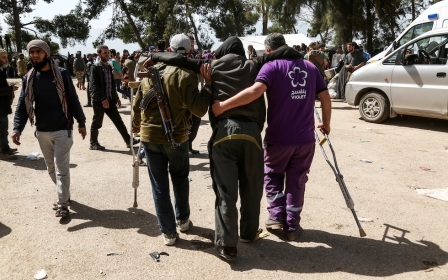Syrian rebels agree 'final evacuation' of Eastern Ghouta

Syrian rebels agreed to a deal to surrender the last remaining area of Eastern Ghouta to government forces, a monitor and local media reported on Sunday, marking a major defeat for opposition forces and an end to a bloody six-week government offensive.
The deal brokered by Russia would see fighters with the Jaish al-Islam rebel faction leave Douma, the main town in the enclave of Eastern Ghouta, for opposition-held territory in northern Syria, the Syrian Observatory for Human Rights said.
There was no immediate confirmation from the rebels, but pro-government newspaper Al-Watan quoted "diplomatic sources" as saying the agreement would see fighters give up heavy weapons in return for leaving.
The retaking of Douma would mark the complete capture of Eastern Ghouta, a rebel bastion on the outskirts of Damascus, and be a major milestone in President Bashar al-Assad's efforts to regain control of territory seized by rebel factions during Syria's seven-year civil war.
Backed by Russia, Assad's forces have scored a series of victories over rebel forces in recent years, often through campaigns of siege, aerial bombardment and ground offensives that have drawn widespread international condemnation.
The Observatory, a Britain-based monitoring group, said Sunday's deal provides for Jaish al-Islam fighters and their families, as well as civilians who want to leave, to be evacuated to rebel-held areas in the northern province of Aleppo.
These include the areas of Jarabulus and Al-Bab, which are largely held by pro-Turkey rebels, it said.
Late on Saturday, negotiators reached a deal to evacuate wounded Jaish al Islam civilians and fighters to Idlib in the northwest.
A group of stranded fighters from another rebel group, Failaq al Rahman, left Douma on Sunday, state media said.
Government forces had already retaken more than 95 percent of Eastern Ghouta in a six-week air and ground blitz that has killed hundreds of civilians and forced tens of thousands from their homes.
On Sunday, Pope Francis called for an end to "carnage" in Syria in his Easter message.
"Today we implore fruits of peace upon the entire world, beginning with the beloved and long-suffering land of Syria," the pontiff said.
'Choice of dying or leaving'
Syria's conflict has killed more than 350,000 people since 2011 and spiralled into a complex war involving world powers.
Appealing to the "consciences of all political and military leaders," Francis urged "that a swift end may be brought to the carnage".
Successive evacuation deals were reached with rebel forces in parts of the enclave, with more than 45,000 fighters and civilians bussed out in recent weeks, according to figures provided by state news agency SANA.
To abandon your home is to abandon your soul
- Haitham, Douma media activist
Opposition sources say Jaish al Islam officials have been desperately trying to strike a deal that would bring Russian military police into Douma, and let the group keep a role in maintaining internal security but under the state's overall jurisdiction.
Russia, a key ally of President Bashar al-Assad, has told the group it accepted such an arrangement but the Syrian government remained against it, a senior opposition source familiar with the talks said.
A civilian committee taking part in the negotiations with Russia said a deal had been reached "to evacuate humanitarian cases to northern Syria". It gave no further details on what role Russian military police would play nor did it say when evacuations would start.
"But I won't go to regime-held areas to join ranks with the Syrian army," he said, adding he would prefer to go to Idlib.
Haitham, 38, a media activist who did not give his surname, said he would rather stay in his hometown.
"To abandon your home is to abandon your soul," he said. "But if they give us the choice of dying or leaving, it will be another matter."
The government assault since February 18 has killed more than 1,600 civilians, the Observatory says, and devastated entire neighbourhoods.
Middle East Eye propose une couverture et une analyse indépendantes et incomparables du Moyen-Orient, de l’Afrique du Nord et d’autres régions du monde. Pour en savoir plus sur la reprise de ce contenu et les frais qui s’appliquent, veuillez remplir ce formulaire [en anglais]. Pour en savoir plus sur MEE, cliquez ici [en anglais].





